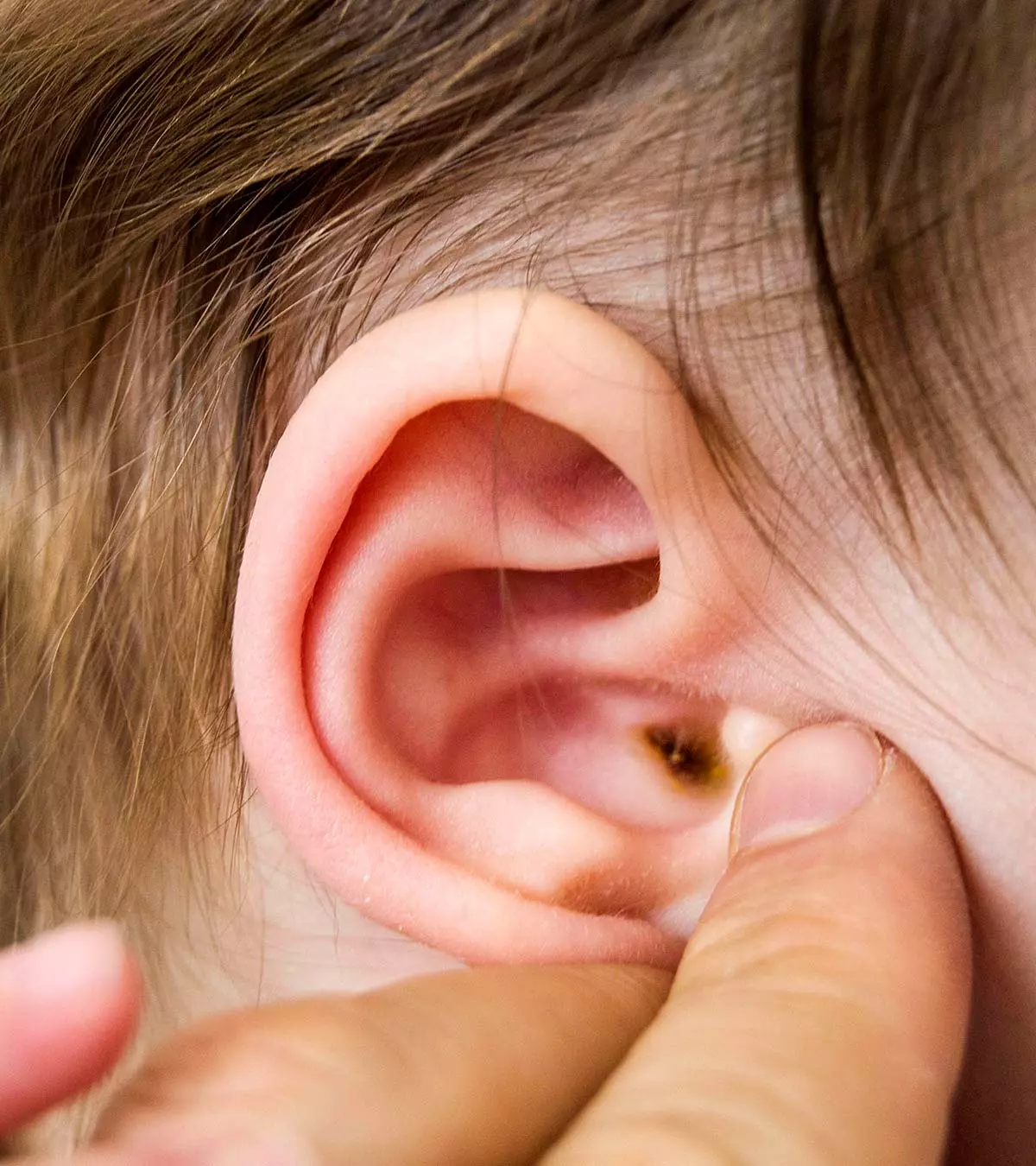
Image: Shutterstock
The teenage years are marked by several physical, emotional, and hormonal changes. And these changes make teenagers more prone to behavioral issues, such as stubbornness. In this post, we share tips on how to deal with a stubborn teenager. If your child is stubborn, shouting or lashing back at them is not the answer. Instead, you should exercise your assertiveness in a firm yet calm manner and teach them about being respectful towards the family. Reacting to their stubbornness by losing your temper will only make things worse. Read on to learn a more detailed approach to parent stubborn teenagers.

Key Pointers
- Teenagers undergo physical, emotional, and hormonal changes, which may lead to behavioral issues such as stubbornness.
- Parents should remain calm and avoid criticizing a stubborn teen, as it could worsen the situation.
- Understanding the teenager as an individual, being aware of their life events, and considering their perspective can help in dealing with stubbornness.
- Encouraging good behavior and acknowledging their accomplishments can motivate teenagers to adopt positive behaviors.
How To Deal With Stubborn Teenagers
Teenage is a delicate and transformative stage where teenagers undergo multiple physical and psychological changes, which may sometimes bring out problematic behavior in them. They may become stubborn, aggressive, defiant, moody, irritable, and disrespectful, which parents may find challenging. Here are a few effective and practical suggestions for dealing with a stubborn teenager.
1. Your teen is an individual too, not just a teen
One of the biggest misconceptions about the teenage years is that every teen behaves in a certain way. While you may feel that is correct, it is not fair to generalize your teen with everyone else. One of the first steps you need to take to reach out through your teen’s stubborn streak is to understand them as an individual. Figure out their quirks and unique traits, and try to understand why they behave the way they do. Their stubbornness may be a response to their surroundings or they can simply be headstrong.
Tip: Let your teen see that you respect their individuality and that you know there is no single way to handle situations.

2. Understand your teen
You may think that you know your teen, but how well do you know them? As a parent, you may know about things like what your teen likes to eat or who your teen’s best friend is. But these are all questions that most parents may know of their teens, as a by-product of living together.
To understand your teen, ask yourself questions that will tell you how well you know your teen’s real life, their boundaries, and their world. Learn about their values, emotions, struggles, and the way they view themselves and the world around them. Teens are at a transitional stage, where they are emotionally, mentally, and physically vulnerable and ever-evolving. To understand that, you must pay attention to their emotional world.
Tip: Try and understand more important aspects of your teen’s life. Find out what embarrasses them, what they do when they are sad or lonely, who they turn to for sharing their worries, what scares them, or what fears they have. Have patience and empathy.
 Point to consider
Point to consider3. Know your battles and don’t stress on every topic
can almost be a daily affair. If you indulge in every disagreement and fight with your teen, it will only create an atmosphere of hostility. It will also make your teen act more stubborn towards you.
Often, intrusive parenting elicits stubborn behavior from adolescents and teens. Your teen’s problematic behavior may be a result of your dysfunctional guidance, creating a mental issue described by the DSM-V as Oppositional Defiant Disorder (ODD). If your teen is angry, irritable, argumentative, and constantly showing defiance and vindictiveness, they may be pushing against rules you’ve imposed without explaining why or ones that seem unjust and unreasonable. They develop ODD as a defensive strategy when they deem you too strict, controlling, and possessive, for no good reason (7) (8). So, understand what topics are more important and need to be taken up with your teen, before becoming too obsessive with discipline.
Tip: Make sure you don’t communicate displeasure with anything and everything that your teen does. Pick your topics depending on necessity and importance. For instance, do not admonish your teen for all clothes choices. Instead, make yourself heard if you feel it is too revealing or inappropriate.

4. Think from your teen’s point of view too
To understand why your teen may be acting stubborn, you need to first understand what your teen is thinking. Try to understand what makes your teen feel truly motivated or interested. Once you understand your teen’s way of thinking, you will know how to deal with teenage attitude and be in a better position to handle any arguments or disagreements. It will build trust, reduce conflict, and help your teen feel seen and supported.
To understand them, you must listen to their concerns without judgment, ask open-ended questions, be there for them, respect their need for space, and find a common ground (2). Instead of jumping to conclusions and making assumptions, ask them about what they are going through, how they feel, and who they are close to. You cannot force them to answer you and they might reject you, but you can assure them that you will stand by them no matter what. When your teen feels emotionally safe and understood, they will open up to you and break through even the most stubborn phases.
Tip: Offer your teen choices that will make decisions easy. ‘You can take out the trash tonight or help with the dishes’ is a good way to let your teen make a choice and take responsibility.
5. Encourage good behavior
Your teen may be stubborn, but it is a growing phase that will surely pass. Make sure that in your communication of anger or displeasure towards stubbornness, you do not ignore the positives.
Always appreciate the goodness that your teen has and offer encouragement for every achievement of your teen that has made you proud. Positive reinforcement goes a long way in managing troubled behavior in adolescents. Also, share your feelings with family and friends and make sure your teen knows how happy and proud they make you.

Tip: Showcase your teen’s different achievements or interests prominently and with consistency. Put up any interesting artwork they may have done or display a trophy your teen may have won.
6. Express unconditional love
According to research, parents who show conditional love negatively impact the development of their adolescent’s optimal secure self-esteem, which negatively affects their self-kindness, self-judgement, and life satisfaction (9). Unconditional love, on the other hand, is widely known to positively impact a child’s self-esteem. A 2013 study from UCLA also found that unconditional parental love can make a child less anxious and stressed, and emotionally happier (10).You should not stop showing love to your teen if they behave stubbornly. Instead, you should balance your unconditional love with clear rules, boundaries, and expectations. Showing love and affection to your child despite their shortcomings or mistakes helps build trust. Accepting your child with all their flaws makes them feel valued and supported.
Tip: Regularly express your love verbally. Remind your teen that your love is unwavering, regardless of disagreements or challenging moments.
Challenges Dealing With Stubborn Teenagers
As a parent, you may find it incredibly difficult to deal with your stubborn teen. They may not understand your perspective, and you may not understand theirs, leading to miscommunication and even more conflict. Here are some strategies to deal with a few of the most common challenges you may face when dealing with stubborn teenagers.
- Defiance and resistance to authority
Challenge: Your teen may push back against the rules you impose as they strive for freedom and independence.
Solution: Power struggle with teens can cause a lot of friction, so set clear and consistent boundaries while also allowing them to have some control over decisions. Collaborate with them to solve problems instead of issuing authoritarian commands.
- Lack of communication
Challenge: Your teen may shut down or refuse to engage to with you, making it even harder for you to understand their needs.
Solution: Create a space for judgment-free conversation, perhaps during activities like driving or walking. Assure your teen that no matter what they say, you will be honest and not react with anger. Actively listen to them during this time.
- Mood swings and emotional outbursts
Challenge: Teens are going through numerous hormonal changes and stress, which can cause unpredictable mood swings.
Solution: Stay calm during their outbursts, do not react with anger, validate their emotions, and avoid escalating arguments. Model the behavior you want them to adopt. Teach them how to use coping skills like deep breathing, journaling, and physical activities, like swimming or running.
- Peer pressure and risky behavior
Challenge: Teens often engage in risky behaviors, such as substance abuse, violence, bullying, and unprotected sexual experimentation.
Solution: Without sounding too preachy, encourage your teen to think critically about their actions and talk about their consequences. Forbidding certain activities rarely helps; however, giving them the tools and making them aware helps them develop the confidence to make safe, informed choices. Consider getting professional help when it comes to addictive behaviors.
Speaking about her teen daughter’s stint with substance abuse, an anonymous mother writes, “Today, I was scrolling through Instagram and a post by my 15-year-old flashed up. She was in front of a tunnel in a balaclava with a spliff in her hand… I am way beyond the weed lectures. I have had so many of them and I know that it won’t make the blindest bit of difference what I say.”
She continues, “I have educated myself when it comes to drugs, and I have tried to educate her. She may not take it on board now, but hopefully, I will have planted some seeds (excuse the pun) and one day they might germinate in her brain. I know that weed is not going to do her any favours right now, but she thinks it helps her, and nothing I say is going to change that right now. She has a drug worker, and he is good. She is more likely to listen to him, but again, it will take time for some of his advice and guidance to sink in (i).”
- Lack of motivation
Challenge: Teens may seem lazy or unmotivated, lacking interest in responsibilities like schoolwork or chores.
Solution: Do not nag your teen. Instead, find out what motivates them and connect those interests to their responsibilities. Let them earn rewards or privileges by completing their chores and instead of giving them a whole list of responsibilities, and break their tasks into smaller goals.
- Screen time and social media dependence
Challenge: A vast majority of teens today are glued to their devices, which makes them disconnected from their family and responsibilities.
Solution: Work with your children to set reasonable screen time limits and give them time and attention through family activities when they are not using their devices. Try to also engage in their digital world to better understand them and protect them from bad influences. And like every other struggle, this struggle can also be managed better by leading with an example. Be mindful of your own screen use. 3
- Identity and self-esteem struggles
Challenges: Teens are at a phase where they are trying to figure out who they are and what their place is in the world. This can lead to self-doubt and insecurity, which can manifest as rash, stubborn behavior.
Solution: Offer positive reinforcement and encourage them to work on their strengths. Create a supportive environment at home and make them feel valued. Support them when they face challenges and teach them to stand up for themselves.
Frequently Asked Questions
1. What is the importance of setting boundaries for teens?
Establishing clear boundaries and rules for teenagers is essential in guiding their behavior and promoting healthy development. By setting defined expectations and consistent consequences, teens learn the importance of accountability and responsibility for their actions. This structure helps them understand acceptable behavior, providing security while navigating their growing independence. Consistency in enforcing these boundaries reinforces the message that actions have consequences, teaching them valuable life lessons about decision-making and self-discipline. Ultimately, clear boundaries support teenagers in developing into responsible, respectful, and self-aware individuals.
2. What is the most challenging age for a teenager?
Research has shown that life is the hardest for most people between 14 to 20 years as they adapt to social, psychological, and physiological changes (4).
3. When do teen girls declare independence?
Teens begin asserting their needs for independence, personal space, and self-dependent decision-making around their middle adolescence. This is when they start understanding self-expression, self-esteem, and try to gain a sense of self (5) (6).
4. How can parents build trust and strengthen their relationship with their stubborn teenager?
Parents may build trust and strengthen their relationship with stubborn teenagers by actively listening to their perspectives and concerns, validating their emotions, and fostering open and respectful communication. Additionally, providing consistent support, setting clear boundaries, and allowing for age-appropriate independence can help establish a foundation of trust and strengthen the parent-teen relationship.
5. What are some potential consequences of being too lenient or too strict with a stubborn teenager?
Being too lenient with a stubborn teenager may lead to a lack of accountability, boundary-pushing, and a sense of entitlement. On the other hand, being too strict can result in rebellion, strained parent-child dynamics, and potential withdrawal or secrecy from the teenager. Striking a balance between firmness and flexibility is crucial for healthy development and a positive parent-teen relationship.
6. What are some potential long-term consequences of not addressing stubborn behavior in a teenager?
Not addressing stubborn behavior in a teenager may result in difficulties in interpersonal relationships, including challenges in forming and maintaining healthy relationships in adulthood. It can also hinder the development of essential life skills such as adaptability, compromise, and effective communication, which are crucial for personal and professional success later in life.
7. How can parents or caregivers model positive behaviors and attitudes for their teenagers?
Parents or caregivers can model positive behaviors and attitudes for their teenagers by practicing good communication, demonstrating empathy, and resolving conflicts peacefully. Additionally, they can showcase healthy habits, such as self-care, resilience, and a growth mindset, which can positively influence teenage behavior and attitude.
Parenting teenagers can be challenging, especially if they are stubborn. If you are wondering how to deal with stubborn teenagers, remember that it is normal for them to show stubbornness. Teenagers are confused as they go through multiple physical, emotional, and mental changes. Parents should understand this phase and deal with the situation patiently. You may also set clear boundaries and be firm to ensure discipline for teenagers so that they maintain some form of decorum. Lastly, give them their space and allow them to think for themselves. It will help them handle situations independently and wisely.
Infographic: How To Deal With Stubborn Teenagers
Are you struggling to get your stubborn teenager to listen and cooperate? Although this experience could be frustrating and challenging, a few techniques can make this task easier. Here is an infographic presenting helpful strategies to manage stubborn teenage behavior and create a harmonious house environment.
Some thing wrong with infographic shortcode. please verify shortcode syntax
Illustration: Effective Tips To Deal With Your Stubborn Teenager

Image: Stable Diffusion/MomJunction Design Team
Disciplining a teenager can seem tough but could be easier if you know the right ways. Take a look at this video for tips and tricks on how to communicate and set boundaries with your teenager.
Personal Experience: Source
MomJunction articles include first-hand experiences to provide you with better insights through real-life narratives. Here are the sources of personal accounts referenced in this article.
i. What not to post on social media;
https://confessionsofagoodenoughmum.wordpress.com/2025/10/12/what-not-to-post-on-social-media/
References
- Disrespectful behaviour in pre-teens and teenagers.
https://raisingchildren.net.au/pre-teens/behaviour/behaviour-questions-issues/disrespectful-behaviour - Help for Parents of Troubled Teens.
https://www.helpguide.org/family/parenting/helping-troubled-teens - Teen Brain: Behavior Problem Solving and Decision Making.
https://www.aacap.org/AACAP/Families_and_Youth/Facts_for_Families/FFF-Guide/The-Teen-Brain-Behavior-Problem-Solving-and-Decision-Making-095.aspx - Learning to Catch Z’s: A Teenagers Guide to Sleep.
https://publichealth.jhu.edu/center-for-adolescent-health - Understanding Teens.
https://pubs.nmsu.edu/_f/F122/index.html - The Growing Child: Adolescent 13 to 18 Years.
https://www.hopkinsmedicine.org/health/wellness-and-prevention/the-growing-child-adolescent-13-to-18-years - Manfred F.R. Kets de Vries; (2018); I Won’t, Therefore I Am: Being Stubborn.
https://www.researchgate.net/publication/327852284_I_Won’t_Therefore_I_Am_Being_Stubborn - Oppositional defiant disorder (ODD).
https://www.mayoclinic.org/diseases-conditions/oppositional-defiant-disorder/symptoms-causes/syc-20375831 - Malin Brueckmann et al.; (2025); What if parental love is conditional …? Children’s self-esteem profiles and their relationship with parental conditional regard and self-kindness.
https://bmcpsychology.biomedcentral.com/articles/10.1186/s40359-023-01380-3 - Lack of parental warmth, abuse in childhood linked to multiple health risks in adulthood.
https://newsroom.ucla.edu/releases/lack-of-parental-warmth-abuse-248580
Community Experiences
Join the conversation and become a part of our nurturing community! Share your stories, experiences, and insights to connect with fellow parents.
Read full bio of Dr. Neha Mehta
Read full bio of Sagari Gongala
Read full bio of Swati Patwal
Read full bio of Apoorva K

 Quick fact
Quick fact
















